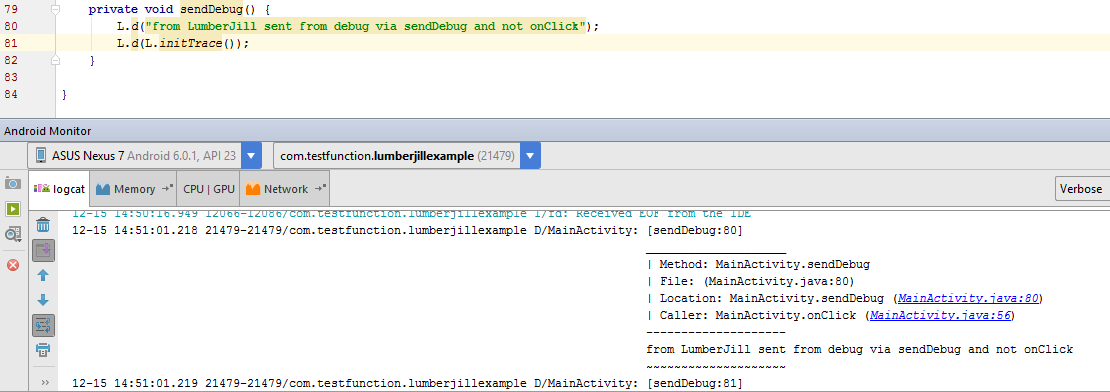LumberJill
LumberJill is a logging Utility library for Android. Whenever LumberJill is used to call a log it will return:
- originating
- file name
- class
- method
- line number
- calling method
- file name
- class
- method
- line number
###Installation Add the following to your module's build.gradle file.
compile 'com.testfunction:lumberjill:0.8.5' ###Implementation In order to use this library you need to provide a class that implements LumberJillCallbacks.
####Create a class which implements LumberJillCallbacks I recommend creating a class which both extends and implements adding for easier and faster access but this is not necessary.
public class L extends LumberJill implements LumberJillCallbacks {
@Override
public boolean isDebugMode() {
return BuildConfig.DEBUG;
}
@Override
public int getDefaultDepth() {
return 5;
}
@Override
public String objectToString(Object object) {
String message = null;
if (object instanceof View) {
message = "View :"+((View)object).getId();
}
return message;
}
}
isDebugMode isDebugMode() this is used to enable or disable logging functionality. I recommend returning BuildConfig.DEBUG. This ensures that no logging calls are made when the app is compiled in production mode.
getDefaultDepth getDefaultDepth() is the default element in the stack trace. In most situations 5 is what you want though if you find that LumberJill is returning the wrong line number then you are likely getting the wrong element in the stack so try adjusting this value until you arrive at the desired elements.
objectToString objectToString(Object object) allows you to create your own custom handlers for objects of a specific type not natively handled by the library. The above sample returns the int id of a View object while the example code in the repo returns the reference name of the View. It is perfectly safe to return null.
####Initiate LumberJill in Application Extend any variant of Application class and in the onCreate pass the class which implements LumberJillCallbacks to LumberJill.init.
public class ExampleApplication extends Application {
@Override
public void onCreate() {
super.onCreate();
LumberJill.init(new L());
}
}
###Methods All log methods return filenames, classes, methods, and lines numbers.
Methods could be called directly LumberJill.d(Object) or via an extended class such as L.d(Object).
| Methods | Description |
|---|---|
| v(Object) | Log to verbose |
| d(Object) | Log to debug |
| i(Object) | Log to info |
| w(Object) | Log to warn |
| e(Object) | Log to error |
| wtf(Object) | Log to assert |
| getException(Throwable) | Returns the message of the exception along with cause message if it exists |
| initTrace() | Returns a string representation of the entire stack trace starting at the point this method is called |
| printExceptionTraceCauses(Throwable) | Recursively prints all exception causes until there are none left |
###Using an extended class such as provided example L
From here you can log anything you want throughout your app:
//String L.d("logged") You can also log arrays, multidimensional primitive arrays, and build your own logging logic for object types.
//Object arrays L.d(new String[]{
"item one", "item two"
}
);
//Primitive multidimensional int array L.d(new int[][]{
new int[]{
0,1,2
}
, new int[]{
3,4,5
}
}
);

